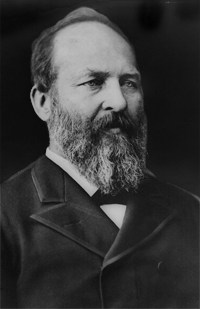Garfield

A blue-eyed, muscular, robust, highly intelligent and emotional man who was convinced that God had planned a great destiny for him, James Abram Garfield -- who was born on this day in 1831 in Orange, Ohio -- grew up in dire poverty and compensated for his material shortcomings with fisticuffs. This pugnacity developed into a sharp debating skill as he matured, studying in Hiram, Ohio and at Williams College, where he devoured classical literature and scripture and frequently preached to Disciples of Christ congregations. It is said that he could write Latin with one hand and Greek with the other at the same time, which really isn't even much of a party trick when you think about it.
He taught for awhile before entering the bar, and shortly thereafter joined the Union Army, seeing action at Middle Creek, Sandy Valley and Chickamauga. He was elected to Congress in 1862, resigned his commission as major general and took his seat. He supported Lincoln coolly, suspecting that Lincoln did not have the missionary's stomach for the anti-slavery cause, and after the Civil War voted to impeach Andrew Johnson for his lenient policies toward the conquered South. Garfield made his first appearance in court as a lawyer in 1866 -- before the U.S. Supreme Court, of all places -- and won.
In 1873, Garfield was accused of accepting a loan and shares of Credit Mobilier in exchange for kind votes with respect to Credit Mobilier's railroad construction activities; Garfield denied receiving shares and admitted receiving the loan, but declared that the transaction did not influence his votes. Despite the implications, he won reelection to Congress.
By 1880 he was House minority leader, and as the Republicans deadlocked between renominating Ulysses Grant and nominating James Blaine or John Sherman for president that year, Garfield was offered as a compromise candidate. A "half-breed" Republican who supported civil service reform, Garfield was not well-liked by the "stalwarts," who forced him to take Chester Arthur, a New York political hack, as his running mate. Garfield squeaked by Democrat Winfield S. Hancock in one of the closest ever popular elections, 48.3% to 48.2% (in electoral votes there was less suspense, 214 to 155).
True to his reformist nature, he appointed an independent candidate to the key patronage position of collector to the Port of New York (a position formerly held by vice president Arthur), prompting stalwart ringmaster Roscoe Conkling to resign from the Senate in protest. Within months after taking office, Garfield was shot by Charles Guiteau, a deluded stalwart footsoldier and religious fanatic who believed that God had told him to kill Garfield in order to save the Republican party.
Garfield survived the immediate wound, but his condition worsened as doctors prodded and poked him while determining that the wound was inoperable. He asked to be moved from Washington to the New Jersey shore, and he was transported by special railcar to Elberon (across tracks covered with straw to reduce the noise), where he died on July 2, 1881. Arthur was in grief over the stalwart connection to Garfield's murder, and, quite astonishingly, became a reformer.
Labels: American Politicians, US Presidents





0 Comments:
Post a Comment
Subscribe to Post Comments [Atom]
<< Home